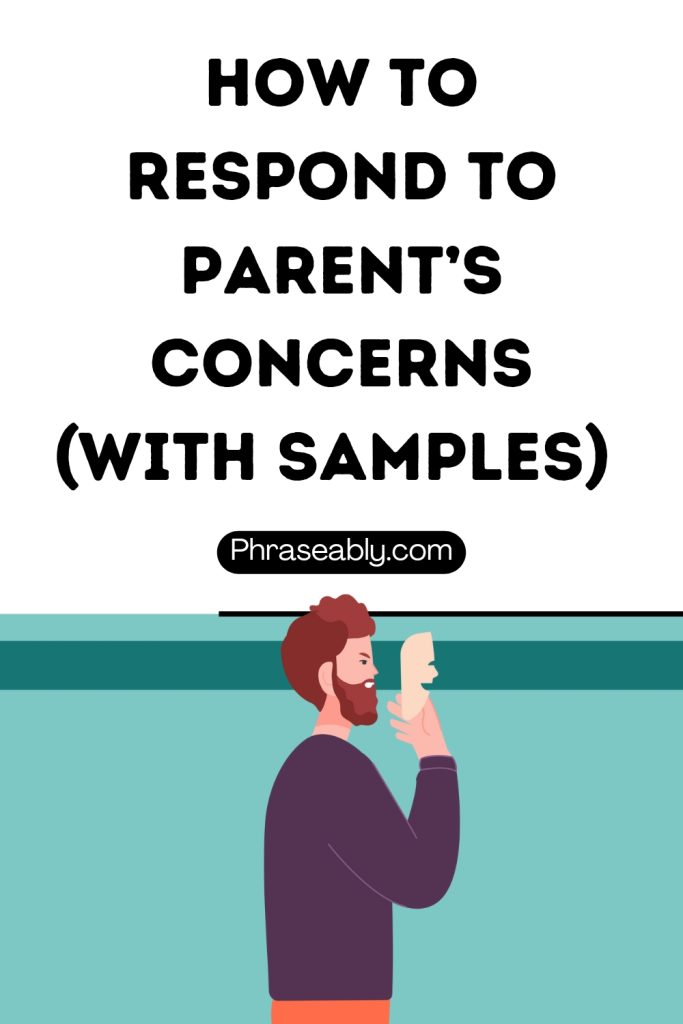As a professional teacher, you’ve probably had a parent or guardian send you an email questioning a decision you’ve made at some point in your teaching career.
It’s natural to feel a bit uneasy in these situations. Even though you feel tempted to pour out your thoughts in your reply, remember that once it’s sent, you can’t take it back.
How we write often creates our first impression, and rushing can lead us to convey a tone or message we didn’t mean.
In this article, we’ll go over some common complaints from parents and how to respond effectively. Whether you’re a teacher or educator, there’s useful advice and templates here to guide your replies. Let’s get started.
Common Parent’s Concerns That Teachers Receive
At Phraseably, our top tip, especially if you’re new to the profession, is to recognize that parents’ questioning happens to all teachers, not just you.
It’s nearly impossible to interact with so many different parents every year and not have one or more ask about how you handle things.
Also, knowing how to reply to parents’ comments starts from understanding what their concerns are. Here are some of the common ones you could encounter: :
- A parent justifies why their child missed a test or event, claiming they didn’t know about it.
- A parent questions why their child received a poor grade.
- A parent requests that their child be excluded from a lesson or book because they find it offensive.
- A parent feels the class is too difficult for their child.
- A parent is concerned that their child isn’t getting enough homework (or is getting too much).
- A child has complained to their parent about a negative interaction with you or a classmate.
- A child has complained about being embarrassed by your actions in class.
- A parent makes a late, entitled request for extra tutoring to improve their child’s grades.
There are countless potential complaints you can receive from parents via email. This list isn’t exhaustive but covers some common issues.
From a teacher’s perspective, some of these emails may come across as impolite or rude. However, remember that you are always teaching, even when responding to parents.
You want to address their concerns professionally while maintaining what’s best for your students academically. So, how do you respond?
Best Ways to Respond to Parent’s Concerns
When responding to emails (or phone calls and in-person meetings), we recommend these five steps.
What makes it ideal? Following these steps while typing your response helps you to advocate for yourself as the teacher and the student, without unnecessarily causing a foul relationship with the parent.
Here’s the approach you can use:
Step 1: Start by thanking the parent for their concerns
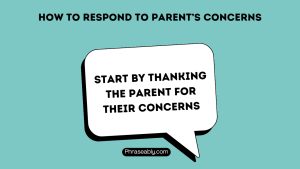
No matter the severity of the situation, you can never go wrong by starting your response with an appreciation for the parent’s involvement in their child’s education.
This shows that you recognize the effort and concern they have for their child’s well-being.
In many recommended templates, you’ll notice that they often start with a phrase like “Thank you for reaching out with your questions” or “I appreciate you taking the time to discuss this matter.”
Step 2: Let them know you’ve considered their perspective
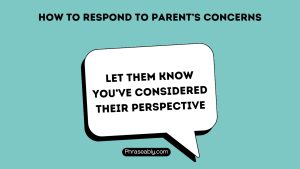
The next thing you want to do in your response is to show them that you have understood their concerns. (this doesn’t necessarily mean you agree with their claims and whatnot).
It is just to show that you’ve carefully considered their perspective. For example, a phrase like “I see you have questions about why David brought home a think sheet” will do just fine.
And you can only do this after reading their mail and asking yourself “Is there really a complaint here? Is there a specific question they are asking me to clarify?”
Quick Tip:
- Read through the email again and highlight any direct questions. Look for any factual inaccuracies, like incorrect dates or grades, and note them.
Step 3: It’s okay to justify your actions (you should, if it is valid)
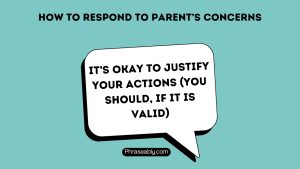
Explain the reasons behind your decisions and actions, especially if that’s the reason why they are complaining.
A parent could email you questioning your teaching method or how you handle behavior issues. Another way of justifying your action is by answering direct questions asked in the email.
For example, if a parent is questioning their child’s low grades, you can say something as direct as “Sam earned a 70 on his unit test and a 60 on the last quiz. His current average is 68.” It’s better than saying, “Sam did perform well.”
So this is the part where you want to make sure the parents understand your rationale.
If your approach is backed by experience, protocol, or the school rules and regulations, share that information.
Quick Tip:
- Defend your decisions but remain open to the parent’s input. Sometimes, their suggestions might be beneficial.
Step 4: Stick to facts and be detailed in your message.
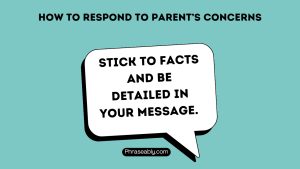
If you need to address a student’s behavior, stick to the facts.
Instead of saying, “Sandra’s behavior in class yesterday was terrible,” ….
Write, “Yesterday in class, Johnny took another child’s notebook, wrote on his desk, and did not return to his seat when asked.”
Don’t just say “Terrible.”
Also, if the parent has incorrect information, correct it politely.
For example, “I see you mentioned John didn’t go to recess yesterday. After a ten-minute time out, he did attend recess with the other students.”
Step 5: Keep the tone positive and confident
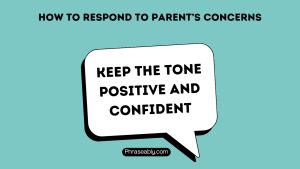
While you’re explaining, don’t share details about other kids in the class.
Stick to general info and make sure your response aligns with what you believe is best for the class and the child.
If you can find a compromise that meets their needs and keeps the class running smoothly, go for it.
Quick Tip:
- Some teachers even have a peculiar signature ending for all the emails they send to parents. Just to ensure they sound confident and positive.
The whole idea is to ensure you’re confident and you don’t let the trade of emotions become the order of the day in the email thread.
How To Respond To Parent’s Concerns: Templates and Samples
Even after understanding these steps, it may be difficult to put the words together depending on the parent’s concern. So here are some templates to further help you respond professionally:
Example 1: To a parent making a late, entitled request for extra tutoring to improve their child’s grades
Thanks for asking about James’s progress in class. I understand your request for extra tutoring for James to improve his grades. However, this is a late request into the session, and I had previously raised the importance of timely support.
My scheduled tutoring sessions can still help. I hold tutoring sessions almost all year long as stated on my website, on Wednesday mornings from 8:05 to 8:30 and Thursday afternoons from 4:15 to 4:45. James is welcome to join these sessions anytime. Thanks for reaching out! I’m here to help.
Example 2: To a parent who feels the class is too difficult for their child
I’m really glad you got in touch. I’m sorry to hear that Emeka has been having some trouble in class. Let’s start by meeting for a tutorial on Wednesday morning from 8:05 to 8:30 or Thursday afternoon from 4:15 to 4:45.
We can talk with Emeka to see what’s going on and then come up with a plan. This might include more tutorials, addressing any class issues, or suggesting extra resources for practice. Thanks for reaching out—I’m here to help!
Example 3: A child has complained about being embarrassed by your actions in class
Thank you for bringing this to my attention. As a teacher, my goal is to work with students and help them learn as much as they can to reach their best. I never want to make them feel embarrassed.
Yesterday, I asked Sam to sit down and stop making noise with his desk in class spoke to him while the other kids were leaving, so no one else noticed.
Seven minutes later, when Gavin stood up during the new activity, I told him, in a normal voice, that he needed to sit down and start working because everyone else was already on task.
I quickly moved on to another student who was ready with an answer, so it didn’t take away from our class time, and no one commented on it. I didn’t realize it caused any embarrassment.
If there’s something else going on that we need to talk about, please let me know. Thanks for reaching out. I’m here to help!
Things to Avoid When Responding to Parent’s Concerns
It always seems like teachers get the toughest emails on the days when they’re most tired or have had to be the most patient. But no matter the situation, try to avoid these mistakes:
- Don’t get defensive in your response. A quick, defensive response can shut down the conversation and might even lead the parent to escalate the issue to the principal.
- You don’t always have to reply immediately (especially if it’s an email or text message). Take time to reflect on the situation How we respond shows parents the culture of our classroom and how we make decisions about their child’s learning.
- Not all matters can be ironed out with email or SMS texts. If an email’s tone suggests a parent’s frustration, a phone call can be more effective.
Use the phone call to listen and understand the issue better.
Expert Tips on Responding to Parent’s Concerns
After combing through some of the personal stories shared by preschool, primary, and middle school teachers on the r/Teachers subreddit, we realized that these tips go a long way in your interaction with parents:
- Make a hard copy of the email by printing it, in case the occasion calls for it.
- Don’t respond to insults or accusations unless correcting factual errors. Stay professional and don’t engage in comments about whether or not you care about the child.
- Use your full name, like “Best, Mr Collins Robert,” rather than a nickname that your students know you with.
- Before sending, use spell check and grammar tools like Grammarly.
It may help to read your reply out loud to make sure it says what you want. Then, send it when you’re confident it’s ready.
Final Thoughts
Every situation, child, and school is different. So there’s no one true structured way to respond to a parent’s complaints.
But with these email templates, you have a solid framework for responding professionally, kindly, and in a way that considers everyone involved.
And by the way, if you feel like you’ve just gone through a frustrating parent conference or an upsetting email, take a moment to email the parent of a great student. Let them know you enjoy having their child in class.
Many teachers on r/Teachers subreddit swear that this helps them stay positive, rather than dwelling on the negatives.
